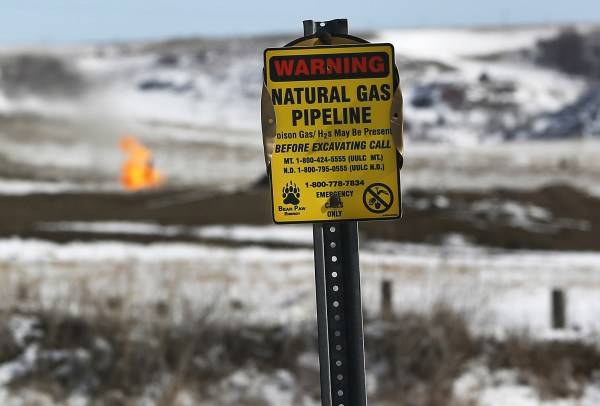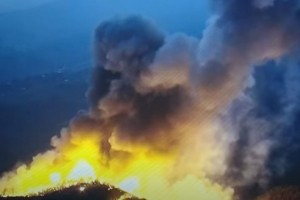Why we need methane rules

Wayne Warmack is a contributor to Writers on the Range, the opinion service of High Country News. The owner and operator of Double W Ranch in Durango, Colorado, he retired from ConocoPhillips after a 27-year career in the oil and gas industry.
For almost three decades, I worked in the oil and gas industry, moving 22 times to job sites that ranged from Bloomfield, New Mexico, to the Norwegian Sea. In the Four Corners area, I helped make sure that 3,000 wells sent their oil and gas by truck and pipelines to trade centers and final markets.
Wherever I worked, one thing remained constant: It was clear that voluntary measures to address problems were never enough. The oil and gas industry, driven by profit, needed firm but fair regulations to ensure a safer and cleaner environment.
This is why I am such a strong supporter of new requirements from the U.S. Bureau of Land Management to limit the waste of taxpayer-owned natural gas containing one of the worst global climate-changing pollutants — methane. The Methane and Waste Prevention rule, developed during the Obama administration, would require oil and gas companies to monitor for leaks, which include noxious chemicals like benzene, and to repair outdated detection equipment.
So far, the industry’s record on voluntarily reducing methane waste has been poor to nonexistent. For example, the federal government’s current voluntary program, the Natural Gas STAR program, has achieved a paltry 1 percent participation rate among the oil and gas industry — not exactly overwhelming.
In addition, the voluntary measures taken by the industry have not been sufficient to capture vast amounts of wasted methane. A recent survey of 65 of the biggest oil and gas companies found that none had taken even the first step in reducing methane waste by disclosing their intent to do so. In fact, less than a third of those companies even report their methane waste. It seems highly unlikely that voluntary approaches will be effective.
The oil and gas industry has lobbied strongly against regulation, arguing that the rule is burdensome. In February, the U.S. House of Representatives heeded industry’s call by voting 221-191 to overturn the rule, using a blunt tool known as the Congressional Review Act. The Senate is next to cast its vote, so we’re down to the wire. If successful, the review act would prevent any similar rule limiting methane waste from being put in place without congressional action.
Yet the fears of industry are not supported by on-the-ground evidence. Leak detection, for instance, can make oil and gas production much more efficient. One survey found that 7 out of 10 Colorado operators said the benefits of regularly checking equipment for leaks outweighed the costs.
The oil and gas trade associations in Colorado tried to argue the same points when this state was finalizing state methane rules. But three years later, leaks in Colorado are down, while production continues to be strong. In fact, Colorado industry trade groups now tout the success of the Colorado methane rules.
As for the concerns about additional costs leading to the shutting down of the hundreds of low-production “stripper wells” that exist, the BLM’s rules expressly allow these wells to be exempted from specific provisions if the operator can demonstrate that the rules could put it out of business.
In fact, oil and gas companies have acknowledged that federal regulations have little to no impact on the level of production, according to their filings with the U.S. Securities and Exchange Commission.
So there is no reason to believe that complying with the BLM rules across the Four Corners would be any less successful than complying with Colorado’s statewide rule. Meanwhile, we know now, thanks to scientific studies, that the Four Corners area emits the largest cloud of methane pollution in the United States. This pollution has been tied directly to poorly maintained oil and gas infrastructure. Curbing this poison to our atmosphere is bound to require a regional approach — exactly the sort of effort the BLM’s rule could spearhead.
Production of natural gas is expected to increase by 56 percent in the United States by 2040, while also increasing by 64 percent outside of the United States. If we foster the development of the methane-mitigation industry here over the next decade, the world will be buying American-made — not foreign-made — products and services to capture valuable methane emissions. Here at home, that will create high-paying jobs and spur economic growth.
The BLM methane waste rule makes sense for industry and local economies throughout the West, while also making sense for our air. Our U.S. senators should oppose any efforts to roll it back.
Suggestions
 The Minister of Environment addressed a letter to international organizations and partners
The Minister of Environment addressed a letter to international organizations and partners
 ECOCIDE ALERT IN THE SOUTHERN CAUCASUS! White phosphorous munitions are dangerous chemical weapon
ECOCIDE ALERT IN THE SOUTHERN CAUCASUS! White phosphorous munitions are dangerous chemical weapon
 The SunChild 7th International Environmental Festival encompasses 83 films, 9 workshops, and 5 exhibitions
The SunChild 7th International Environmental Festival encompasses 83 films, 9 workshops, and 5 exhibitions
 Lake Sevan, Armenia. most incredible — and affordable — undiscovered holiday destinations in Europe
Lake Sevan, Armenia. most incredible — and affordable — undiscovered holiday destinations in Europe
 80 BEARS. SAVE THE BEARS OF ARMENIA
80 BEARS. SAVE THE BEARS OF ARMENIA












